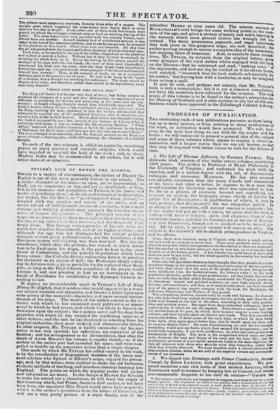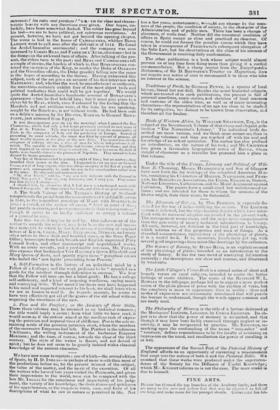2. We dipped into Evenings with Prince Cambacerh, Second Consul,
by Baron LANGON, with great expectations. We Pro- mised ourselves some rich traits of that modern APICIUS, whom NAPOLEON used to torment by keeping late at Council, and whose ever-memorable despatch to his chef de cuisine—" Gardez IN • The tobacco was tot merly not transported in waggons, as at present, but by a meek simpler premiss. The hogshead, in which it was packed, had Is W004111,41 doyen low emit head, to which were adjusted a pail 01 rude shafts ; and thus. in the way of a garden toiler, it was drawn to market by horses. Those who (Meowed this Inb.iness if tobaeco.wIlin4 formed a class by themselves—hardy. reckless. proverbially rode, In oheu indon2ing in coarse humour, ut the expeuse ut the travel', r who chanced to 14 well dressed, ur titting lu it carriage. entremets 1 les rotis rant perdues ! "n gt,,, vie for clear and charac- teristic brevity with any directions ever given. Our hopes, un- luckily, have been somewhat dashed. The colder has gone beyond his last—we are to have political, not epicurean revelations. At present, however, we have not got beyond the opening chapter. The scene is laid in the house of CAMHACKRES, whither Baron LANGON went to call soon after the abdication of 1814. He found the Arch-Chancellor sentimental ; and the company was soon increased by Counts REAL and FA BRE DE L'AUDE, also some%% hat in the dumps on the awkward turn of affairs. After talking of the pre- sent, the elders turn to the past; and REAL and CAMBACERES tell a couple of stories, the burden of which is, that ROBESPIERRE con- trived the execution of the King, to render the Duke of ORLEANS and the Girondinsodious, the Duke greedily falling into the snare in the hopes of succedine to the throne. Having exhausted this subject, each of the set gives an account of his first interview with NAPOLEON; and, whether the work be manufacture! or authentic, the narrations certainly exhibit four of the most abject tools and political toudeaters that could well be got together. We would quote the Arch-Chancellor's bombastic account of BONAPARTE's appearance when lie first beheld him ; but it must give place to a clever bit by REAL, which, even if coloured by the feeling that the Marshals and not civilians were, at the time he was speaking, sought by the Bourbons, is not without truth. He had been sent on a delicate mission by the Director, BARRAS, to General BONA- PARTE, just returned from Egypt.
It was three-quarters past six (in the morning) when I entered the Rue Chantereine, which had only a few hours prevenely received its new name of Rue de la Victoire. This was a token of respect from the municipality of Paris to the conqueror of Italy and the pacificator of Europe. Instead of presenting its usual solitude, the street was filled by a crowd of persons. all eager to incense at the altw of the new deity. The crowd was chiefly composed of military officers, a c!a-s of men for whom independence i-
ill
suited. The equality of the Republic had become odious to them ; and they were impatient to serve somelliing or someleoly. These heroes on the field of battle, were humble slaves in the presence of :Napoleon. They seemed to have divined his future greatness. Very few of them succeeded in gaining a sight of him ; but no matter—they inscribed their names at the door. I happened to east toy eyes on General C—, a sort of lung serpent, who was always creeping at the feet of people in power ; and, cotes tautly, he made his way to die :oitechambers rather than in the army. Ile advanced and min actil toe.
" dear friend," said he, are ',it my intimate with the General in Chief, Iton, ute ? Yon are very fort unato, and 1 envy yen. Prayavwc him how high'v I admire—"
I checked 11:ni, by obset vim!: that I had nevcr c, t exchanged words with General Bonaparte. He then tin aril his b irk, and wiled me good morning.



























 Previous page
Previous page